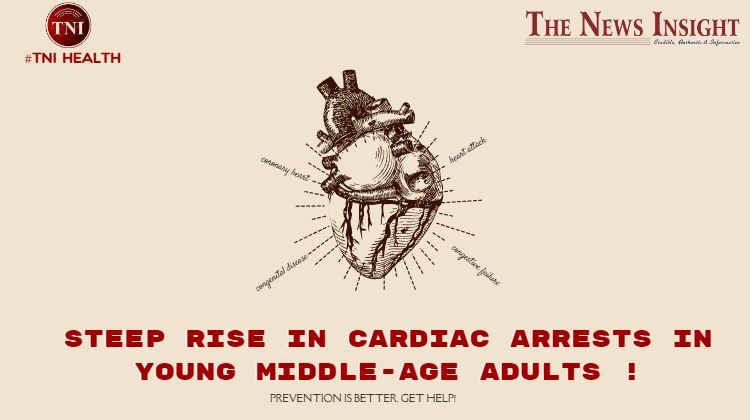Why Cardiac Arrest is rising among Young and Middle-age Adults
The risk of sudden cardiac arrest among people in their mid-30s to mid-40s has increased by 13%
TNI Bureau: The sudden demise of 24 Y/O Bengali actress Aindrila Sharma’s death due to Cardiac Arrest has left everyone in a stunned and grieving mood. The horrific incident has shocked both committed fans and members of the film industry. While some express their sorrow over the actor’s loss, others point out the brevity of life and express concern about the rising number of heart attacks among younger people.
#CardiacArrest claims #Bengali Actress #AindrilaSharma's life.#AindrilaSharmaPassesAway#TNI #TheNewsInsights https://t.co/42Pab4dBKj
— The News Insight (TNI) (@TNITweet) November 20, 2022
Heart attack, cardiac arrest, and other cardiovascular disorders have remained a major global health concern, but it has only lately been more common to detect and report cardiovascular issues in the younger population. Although doctors and other medical professionals haven’t yet come up with a definitive explanation for these incidents, they have identified a few potential contributing elements.
Prior to digging further into the subject, lets understand what actually Cardiac arrest is?
According to Dr. Sudhir Pillai, a Consultant in Cardiology at P.D. Hinduja Hospital in Mahim, Mumbai, a blockage or blood clot forming within the arteries that limits blood flow to the heart is known as a heart attack or a myocardial infarction.
The coronary arteries may become narrowed as a result of plaque formation, which is a result of fatty deposits, including cholesterol, and can unexpectedly obstruct blood flow to the heart, resulting in a heart attack. Having said that, the majority of heart attacks can be fatal, necessitating prompt medical attention whenever they happen.
Support Independent Journalism? Keep us live.
Without prior notice, sudden cardiac arrest causes the heart to stop beating. The irregular heartbeats brought on by an electrical fault that prevents the heart from pumping blood to the body cause it to happen. If a person with sudden cardiac arrest is not helped within the first 6 minutes, they will die suddenly. A cardiac arrhythmia is a variation of the normal heartbeat, which ranges from 60 to 100 beats per minute and can be either too slow (bradycardia) or too fast (tachycardia). A fatal arrhythmia can occur in people who have a sudden increase in heart rate or who are genetically predisposed to heart conditions.
The risk of sudden cardiac arrest among people in their mid-30s to mid-40s has increased by 13%
The increasing prevalence of heart disease among young people in this day and age is not shocking. Recent American research has found that the risk of sudden cardiac arrest among people in their mid-30s to mid-40s has increased by 13%. According to the Indian Heart Association, heart disease also tends to afflict Indians earlier than it does other populations and frequently without warning. Few studies have revealed that Indians have heart disease at least ten years earlier than Westerners. Young people are experiencing more Sudden Cardiac Arrest (SCA) cases due to sedentary lifestyles, diabetes, rising alcohol intake, smoking, and hypertension. One such cause prevailing in every youth is sedentary sleep time, and unhealthy practice of eating food.
Since the dawn of time, cardiovascular disorders have existed. It has been wreaking havoc for a long time and was neither recently diagnosed nor discovered. Heart diseases, however, have discovered a way to affect the younger population as well, deviating from their usual pattern of focusing on the elderly and those with pre-existing heart conditions. People have been alarmed, concerned, and have begun to doubt the science involved.
Although there is no specific age at which someone will have a heart attack, your lifestyle choices, diet, exercise program, and stress management techniques can all affect your chances.
Measures To Be Taken as a Precaution
One needs to adopt a healthy lifestyle on a daily basis if they want to maintain good health. a nutritious diet, frequent exercise, abstaining from and kicking drug and smoking use, controlling alcohol intake, managing sleep patterns, and stress management are all part of a healthy regimen. Additionally, one should be aware of any family history they may have and take the appropriate safety precautions. At this point, seeing a cardiologist should be your first priority. Regular check-ups are essential for diagnosing any problems and treating them with the medications and regimens your doctor may advise.


Comments are closed.